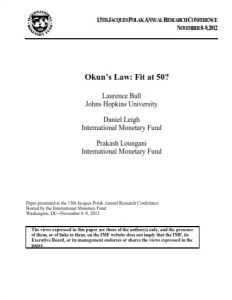Join getAbstract to access the summary!

Join getAbstract to access the summary!
Laurence Ball, Daniel Leigh and Prakash Loungani
Okun’s Law
Fit at 50?
IMF, 2013
What's inside?
Should nations drop stimulus policies in light of jobless recoveries, or does Okun’s Law still hold?
Recommendation
Economists Laurence Ball, Daniel Leigh and Prakash Loungani analyze an economic relationship of vital importance for policy makers, particularly in light of the current phenomenon of jobless recoveries. This International Monetary Fund paper addresses the recent views that dismiss Okun’s Law as defunct, based mainly on the emergence of growth coexisting with unemployment. But data show that the Okun relationship between output and employment holds in most countries, with critical implications for those who are making policy based on the idea that the Law is broken. This paper’s technical, formula-driven scope speaks mainly to academicians and economists. Unfortunately, it does not delve far enough into the role of Okun’s Law in policy making or in economic forecasting. Nevertheless, the report’s results swim against the current media tide in an area that could influence macroeconomic policy across nations for some time to come. getAbstract applauds this paper’s insights in applying evidence-based research to the debate on how to tackle widespread unemployment.
Summary
About the Authors
Laurence Ball, the author of Money, Banking and Financial Markets, is a professor at John Hopkins Universtity and a visiting scholar at the IMF, where Daniel Leigh is a senior economist and Prakash Loungani is an adviser. Loungani also teaches at John Hopkins University and at Vanderbilt University.



















Comment on this summary